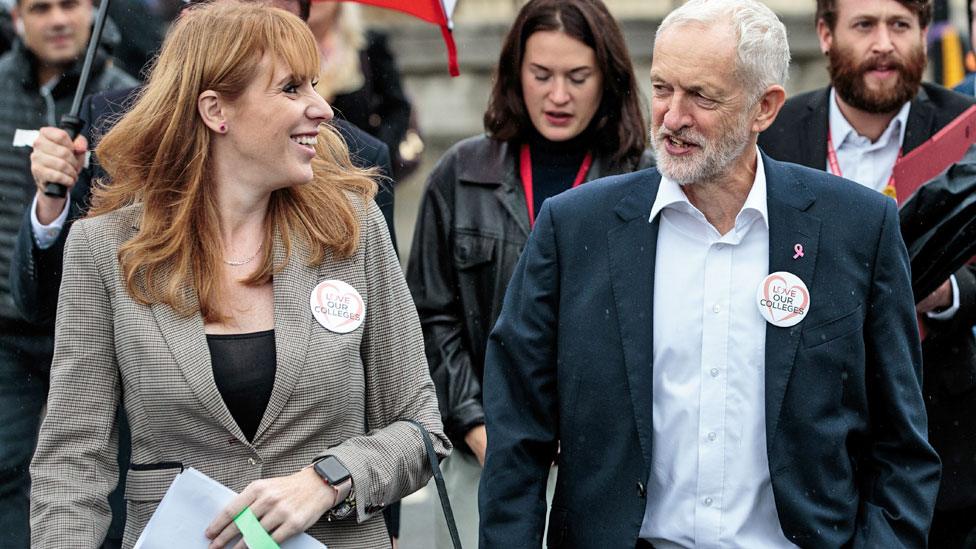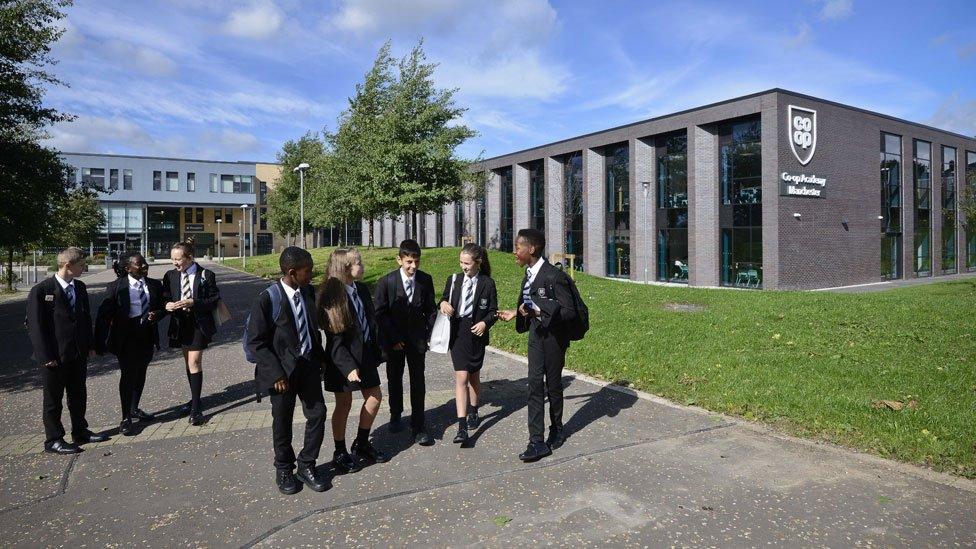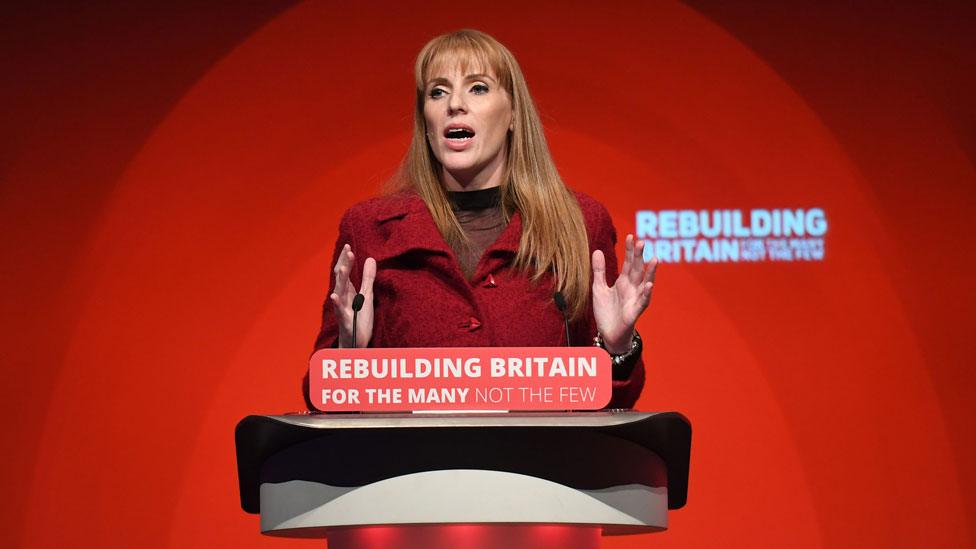Is Labour tied in knots over academies?
- Published
- comments

Angela Rayner and Jeremy Corbyn: What is Labour offering families with children in academies?
The Labour Party has shifted to a more hard-line policy on schools, saying it would scrap the current academy system.
But dozens of its own MPs are part of a group opening academies and planning to become one of England's biggest academy providers.
There are 37 "Labour and Co-operative" MPs - but when it comes to schools policy, the Labour and Co-operative parts of their title seem to be pulling in completely different directions.
The Co-op, part of the fibre of the Labour movement and a sponsor of MPs, is itself the sponsor of its own multi-academy trust - running academies.
But Angela Rayner, Labour's shadow education secretary, has a policy to stop the creation of any academies.
"We'll start by immediately ending the Tories' academy and free schools programmes. They neither improve standards nor empower staff or parents," she told the party conference.

The Co-op wants to expand to run 40 academies, which would make it one of the biggest providers
The Co-op trust currently runs 13 schools, focused on improving standards in the north of England.
And it wants to push ahead to take over 40 academies, which would make it among the biggest academy trusts in the country.
But this ambition would have to be ditched under Labour's policy.
Improving schools
The Co-op trust has been commended for turning round underachieving schools, such as tackling truancy at its Co-op Academy Manchester.
And as the Co-op is using its resources to support Labour MPs and also to back its academy expansion, which Labour now wants to stop - there is, to say the least, some confusion.
Labour's Co-op MPs include:
shadow education minister Tracy Brabin
former Education Minister Stephen Twigg
former Education Select Committee chairman Barry Sheerman
former shadow education secretary Lucy Powell
Meg Hillier, who chairs the Public Accounts Committee

The Co-op Academy Manchester now has one of the best attendance rates in the country
Speaking privately, there are Labour parliamentarians who admit they don't understand the party's plans for re-organising schools.
The Co-op is also unimpressed to have the efforts of its academy trust written off.
"If we look at the work of strong, socially minded academy trusts - and there are quite a few - we find a burning desire to end social injustice," says the Co-op Academies Trust's chief executive, Frank Norris.
"There are some, and I would add our trust to the list, who have radically improved the lives of those it serves," he said.
Structures and standards
There are wider questions about what Labour really plans for academies.
This was a type of state-funded school originally created by Labour, operating outside of local authority networks and increasingly grouped together in trusts.

Angela Rayner promised Labour's conference an end to the academy programme
Labour says there are no contradictions between the Co-op's plans and its proposed academy reforms - and that under a different structure it will be able to sponsor new schools.
It says that multi-academy trusts - known as Mats - will no longer be able to expand - but under a new format, "co-operative academy trusts" - to be known as Cats - they will be able to take on schools.
It will literally be a case of the Cat sitting on the Mat.
But the new Cats will have a greater role for local authorities and all schools will have a "common rulebook", which a Labour spokesman says will ensure "fairness and consistency".
No turning back
What makes it complicated for Labour is that it isn't starting with a blank page.
Already 66% of secondary schools are academies - and 29% of primaries - with more than 1,000 more academy conversions in the pipeline.

Academies and trusts would be re-organised under Labour
These are run by almost 2,700 separate academy trusts.
It's a system that's been accused of being Byzantine and financially inefficient and there have been complaints about a lack of accountability.
But it's not possible to turn back the clock - as many local education authorities no longer have the capacity to run all their local schools.
Labour says it wants a "common rulebook" for all schools. But it's worth remembering that the last attempt to create a single, one-size-fits-all system turned out to be a political disaster.
In 2016, the Conservative government announced all schools must become academies.
But its own backbenchers, confused as to why outstanding local authority schools should be forcibly turned into academies, torpedoed the policy and forced an embarrassing U-turn.
'We want to expand'
If Labour pushed to get rid of academy trusts, regardless of whether they were any good, it might face the same accusation of pursuing ideology over practical achievement.
If the Conservatives have been accused of being blind to academies' weaknesses, Labour might be accused of being blind to their strengths.

Labour in office promoted the expansion of academies
Labour MP for Harrow West Gareth Thomas, who chairs the Co-op Party, said he welcomed Angela Rayner's commitment to co-operative values in schools.
Her conference speech promised to replace free schools with a new name, "co-operative schools", backing the co-operative ethos.
But there are still questions within Labour about what happens to existing academies.
"We want the Co-op school sector to expand - and we look forward to conversations with Labour to see how that can happen," said Mr Thomas.
- Published4 October 2018
- Published2 October 2018
- Published3 October 2018